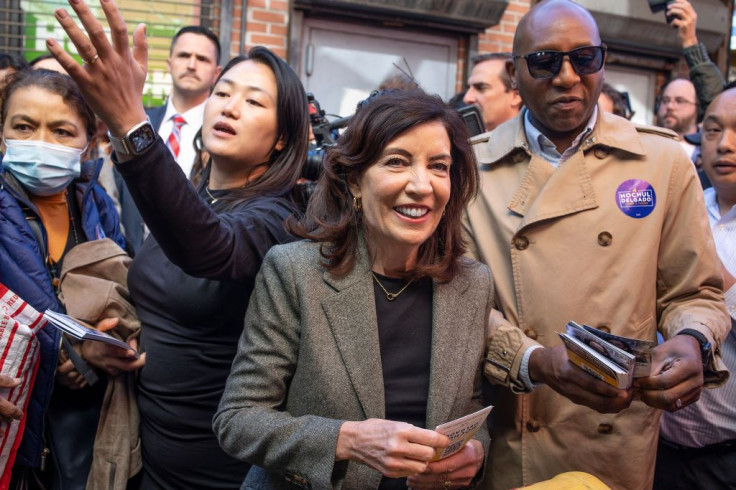
NEW YORK CITY - New York Gov. Kathy Hochul delivered her third State of the State address in Albany, N.Y. on Tuesday, outlining her agenda for the upcoming year and her administration's priorities.
Mental health, affordable housing and crime were among the Governor's major concerns for the state. She cited mental illness as "the defining challenge of our times," pointing out the public safety problems that stem from it and the harmful effects of social media in teens.
The hour-long speech was accompanied by a 174-page briefing book highlighted the state government's goals, services and policies, but only in rough form. Further details on these plans are set to be negotiated in the budget proposal Hochul, a Democrat from Buffalo, will deliver to state lawmakers next week.
But despite the Governor's clear concerns, there was one elephant in the room— the migrant crisis. In fact, the word "migrant" was never uttered in her speech, which caused some lawmakers to raise their eyebrows.
"Listen, she's got to speak about it because it's going to be a big budget issue," William A. Barclay, the State Assembly's minority leader and Republican, said. "Clearly, they don't have a solution. That's why she didn't mention it."
Here are five key takeaway from Hochul's address:
Shoplifting
Hochul lamented the "brazen" store thefts in which owners are left to replace "broken windows and stolen goods."
To rectify this situation, the Governor proposed a special State Police unit and offered funding to prosecutor's offices to combat retail theft, especially the kind being carried out by organized crime rings.
"Let's get it done," she said. "Let's back our businesses and the workers with the full force of the law, and punish those who think they can break the rules with impunity."
Another shot at NY affordable housing
After her ambitious plans to boost the state's housing was struck down last year by state lawmakers, Hochul opted for a more modest plan in 2024, including expanding steps she took on her own last year, without needing legislative approval.
One of her proposals is to start giving communities that meet growth targets a better shot at winning state grants. This year, she wants to make compliance with those targets a requirement in order to qualify for grants, rather than an advantage in competing for state funding.
She also plans to budget $500 million in state funding to prepare land for housing development. Hochul also ordered state agencies to build 15,000 homes in state-owned land.
"Let's be honest with New Yorkers," she said. "The only thing that will solve this problem is building hundreds and hundreds of thousands of homes."
Expanding mental health services
Hochul highlighted the state's failing mental health infrastructure, pointing out the gaps between the state's mental health care system and criminal justice system. She said there was still work to be done.
"Troubled individuals are discharged from the hospital without receiving the care they need and go on to commit violent acts," she said.
The Governor recalled an incident last month at Grand Central Terminal in Manhattan in which two young tourists were stabbed by a man who had been diagnosed with schizophrenia and bipolar disorder, and who had a history terrorizing family members.
"He should have received help long ago," she said. "We can no longer wait for someone to lash out and hurt someone before we take action, because by then it's already too late."
She plans for a significant expansion of psychiatric services, including 200 new impatient beds, new mental health courts, increased supervision for people on parole and specialized housing for those with a history of arrests and serious mental health issues.
Paid leave for prenatal care
Hochul plans on expanding the state's paid leave program to include up to 40 hours of leave for prenatal care visits, which she claims no other state has. The move comes in efforts to bring down maternal and infant mortality rates, particularly in communities of colors.
Medicaid funding to help strapped hospitals
Many of Hochul's plans for improving New York's low ratings for health care quality and safety involve overhauling Medicaid programs.
Federal regulators approved New York's proposals for spending $7.5 billion through Medicaid over the next three years. This money will go to increasing safety net hospitals that serve poor communities and better fund programs focused on treating social determinants on health, which would help curb health inequality.
© 2025 Latin Times. All rights reserved. Do not reproduce without permission.





